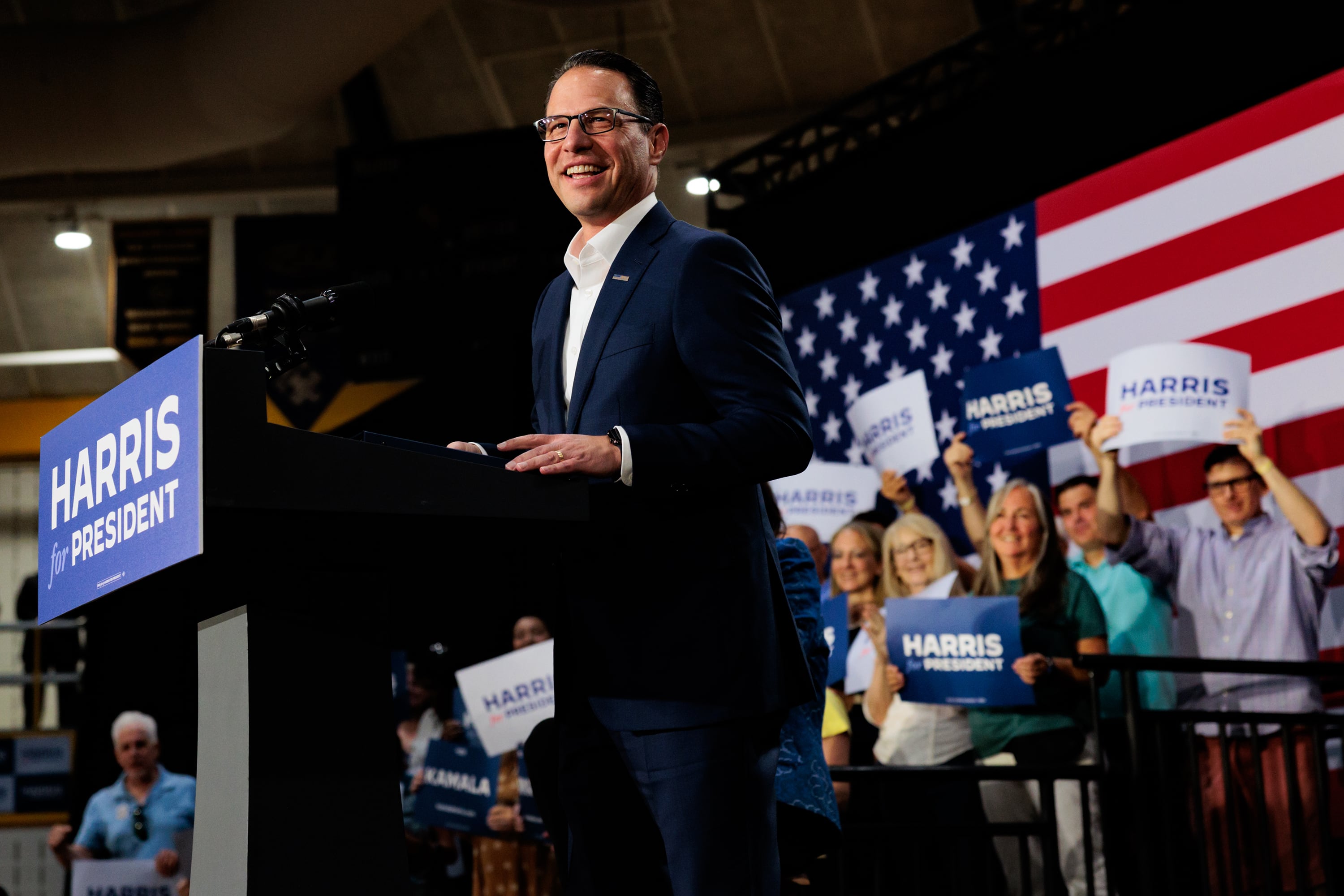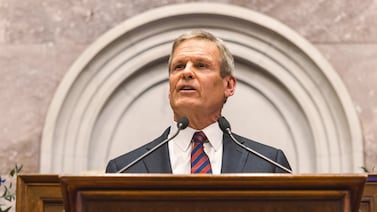Sign up for Chalkbeat Philadelphia’s free newsletter to keep up with the city’s public school system.
Of all the vice presidential candidates reportedly under consideration by Democratic presidential frontrunner Kamala Harris, Pennsylvania Gov. Josh Shapiro has one of the most extensive education records.
But he hasn’t always been in lockstep with the Democratic Party — or teachers unions — when it comes to schools.
His public support of private school vouchers last year drew the ire of some national public education groups. Facing intense pushback from public school advocates, teachers unions, and some fellow Democrats, Shapiro has since tempered that position, and has not resurrected the $100 million state-backed voucher program that he struck from last year’s state budget.
Pennsylvania’s teachers unions, which strongly oppose private school vouchers, have not separately endorsed Shapiro explicitly for vice president.
The state’s teachers unions might welcome Shapiro as Harris’ running mate not so much because they think he would be their biggest champion in the White House. Instead, they could be motivated by the possibility of having a stronger ally in Pennsylvania Lt. Gov. Austin Davis, a Democrat who would take over for Shapiro, according to one source with experience in progressive state politics, who spoke with Chalkbeat on the condition of anonymity to discuss internal conversations.
Soon after Harris emerged as the presumptive Democratic nominee for president, 50 labor leaders, including the presidents of the Pennsylvania State Education Association (PSEA) and the Pennsylvania branch of the American Federation of Teachers, signed a letter of support for Shapiro. The letter does not directly mention Shapiro as a possible Harris running mate.
“Governor Shapiro knows better than anyone that we don’t have to agree on every single issue to continue to get stuff done,” the letter states.
Chris Lilienthal, a spokesperson for the PSEA, said Thursday that Shapiro has a “very good record” on public education, and that “we think he would be an asset to the Harris campaign.”
AFT Pennsylvania did not immediately respond to requests for comment. A spokesperson for the Philadelphia Federation of Teachers declined to comment.
Separately, Shapiro’s support for Israel and strong disavowal of pro-Palestinian university campus protests has also made him a target of progressives, some of whom claim that choosing Shapiro could divide Democrats.
His supporters in Pennsylvania say Shapiro is a measured politician who’s able to course-correct when he gets new information.
“He’s been far more amenable to suggestions that I think most people would ever give him credit for. He’s very good at taking in new information, he’s very good at looking at data, he’s very good at taking a step back to look for a bigger picture,” said state Rep. Peter Schweyer, a Democrat and chair of the House Education Committee, referring to working with Shapiro on education policy.
Shapiro was elected governor in 2022 after previously serving as the state’s attorney general since 2017 and as a state representative.
With Democrats and Republicans splitting control of the legislature, Shapiro was able to negotiate and sign a budget this year that includes record-setting funding for public schools — though not as much as public school advocates would have liked — and increases in state funding for early childhood education and special education.
In addition, he’s secured universal school breakfast for public school students, and pushed for strengthening the state’s K-12 teacher pipeline.
Shapiro has the support of Philadelphia Mayor Cherelle Parker. (Harris’ campaign told Politico that she plans to hold her first rally with her VP pick in Philadelphia on Tuesday.)
“If you want to win Pennsylvania, there is no other candidate in this nation positioned to help us win the White House than our governor, Josh Shapiro,” Parker said at a rally to endorse Harris July 26.
Manuel Bonder, a spokesperson for Shapiro, said that “despite being the only Governor in the nation with a divided legislature – and despite bad faith attacks from all sides – Josh Shapiro has been a champion for public education and delivered real results.”
Here’s what we know about Shapiro’s education record in Pennsylvania:
Shapiro’s past support for school vouchers drew criticism
Shapiro, who attended a private Jewish day school and sent his kids to one as well, originally proposed a $100 million private school voucher program in his budget last year in coordination with state Republicans.
After intense pushback from the teachers unions, public education advocacy groups, and Democrats, he ultimately vetoed the proposal and did not take up the issue again in earnest this year.
“In his second budget, he didn’t bring it up. He didn’t put it in his budget address. And it was never seriously on the table this year,” Schweyer said.
But Shapiro’s willingness to champion vouchers at all, a position shared by some Philadelphia Democrats, did not go over well on the national stage.
During a visit to Philadelphia last year, U.S. Education Secretary Miguel Cardona underscored national Democrats’ views when he said he was “totally against” vouchers. If he were to become the Democratic vice presidential nominee, it’s likely Shapiro would face pressure to express such opposition to vouchers.
In a letter from late July, a group of national public education advocacy organizations wrote that Shapiro’s support for vouchers amounts to him supporting “education policies mirroring Project 2025,” referring to the presidential transition plan proposed by the conservative Heritage Foundation.
But Democrats and public school supporters aren’t alone in their criticism of Shapiro’s track record on private school choice. Vouchers and school choice in general are core parts of the Republicans’ education platform. Pennsylvania GOP members said they felt stung by Shapiro’s initial commitment to the program last year, only for him to subsequently veto the program in the budget.
Still, some education advocates who’ve disagreed with Shapiro’s support for vouchers are still backing him. Schweyer, who said he’s “proudly one of the most anti-voucher legislators” in Pennsylvania, threw his support behind Shapiro and defended his education record on social media.
Schweyer said “what we’ve done in education, I would argue, is more transformative and more impressive than fixing a bridge in 12 days,” referring to Shapiro’s nationally lauded success overseeing the rebuilding of a section of Interstate 95 in Philadelphia.
Despite nixing a private school voucher program, Shapiro has pumped more funding into Pennsylvania’s tax-credit programs that support school choice — the Opportunity Scholarship Tax Credit and Educational Improvement Tax Credit. Both give tax breaks to businesses that donate to organizations that provide private school scholarships to students.
Shapiro condemned students’ pro-Palestinian protests
Along with his support for vouchers, most of the national criticism aimed at Shapiro has come from progressive Democrats, young voters, and pro-Palestinian advocates who say his vocal support for Israel would divide the Democratic Party.
Shapiro, who is Jewish, has been a staunch supporter of Israel and has taken a hard-line stance on university campus protests and encampments at University of Pennsylvania. He called on the university to “disband the encampment, and to restore order and safety on campus.”
He also called former University of Pennsylvania president Liz Magill’s testimony to Congress about campus antisemitism “absolutely shameful.”
However, Shapiro has also strongly condemned Israeli Prime Minister Benjamin Netanyahu, calling him “one of the worst leaders of all time.”
Public school funding got boost from Shapiro
Faced with a court mandate to reform the way Pennsylvania funds its public schools, Shapiro has called for increasing basic school funding by more than $1 billion in each of the last two state budgets he and lawmakers negotiated.
“The results of two years of budgets under Governor Shapiro are almost $2 billion of new funding to schools,” and millions more for other kinds of support for public schools despite Republican attempts to curb funding, Schweyer said.
However, Shapiro and state lawmakers also failed to deliver a long-term plan to move the state towards fully funding public schools.
“The same budget legislation that admits the scope of the Commonwealth’s constitutional shortfall still leaves nearly 90% of that hole to be filled by some undefined date in the future, or not at all,” the Education Law Center and Public Interest Law Center said in a joint statement after the budget signing.
Shapiro turned to teacher pipeline to address shortages
Persistent teacher shortages have plagued Pennsylvania, as well as the rest of the country. Shapiro’s administration has made an effort to grow the teacher pipeline, though educator advocates have said he could have done more.
In the most recent budget Shapiro signed, allocated $1.4 million in funding for districts and universities to “engage” students interested in working with students with disabilities. In Philadelphia, the hardest to staff teacher positions have been in special education.
The budget Shapiro signed also added $20 million more for student-teacher stipends — though the demand outweighed the allocation last year, a trend that’s expected to continue. To provide every student-teacher in the state with such a stipend would cost roughly $75 million annually.
The most recent budget also created a pathway for non-U.S. citizens to become teachers.
Shapiro said he’s ‘building better schools’
Public education advocates have also celebrated Shapiro’s ability to secure universal free breakfast for all Pennsylvania students.
In addition, he’s secured money for much-needed school construction and renovation, a new “solar for schools” energy program, and millions more for career and technical education.
In a post in late July on X, the site formerly known as Twitter, Shapiro touted these and other education policies as examples of his ability to work with Republicans.
“We’re building better schools for the next generation of Pennsylvania leaders,” Shapiro said.
Carly Sitrin is the bureau chief for Chalkbeat Philadelphia. Contact Carly at csitrin@chalkbeat.org.







